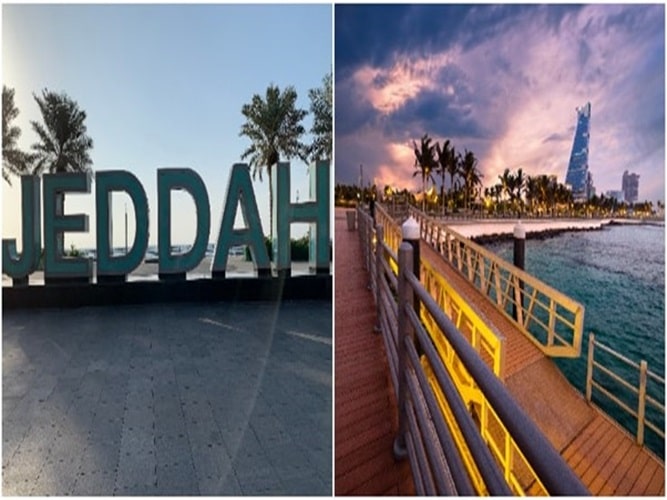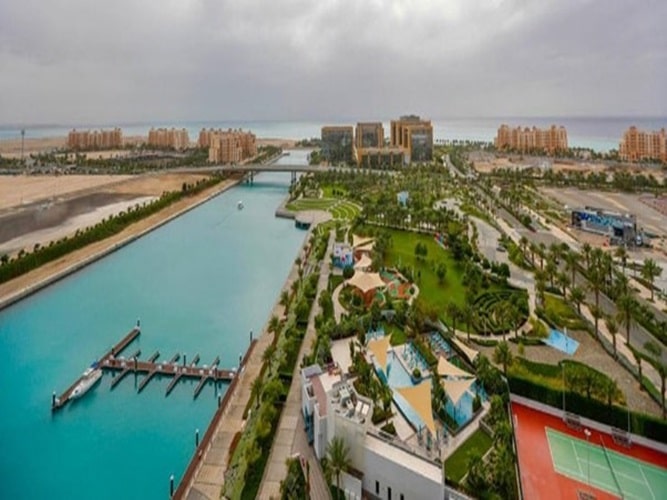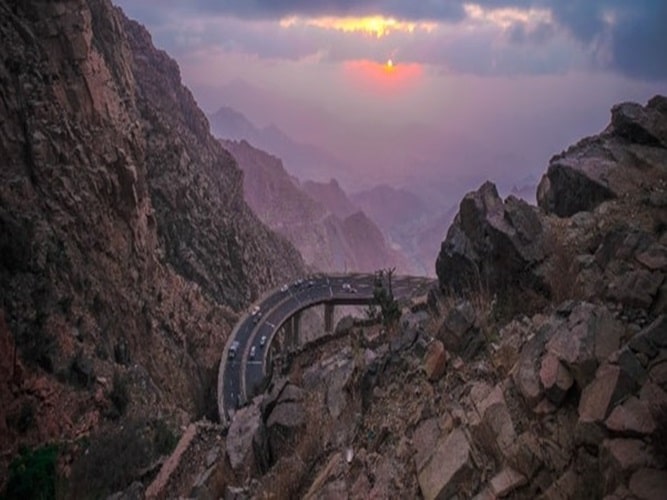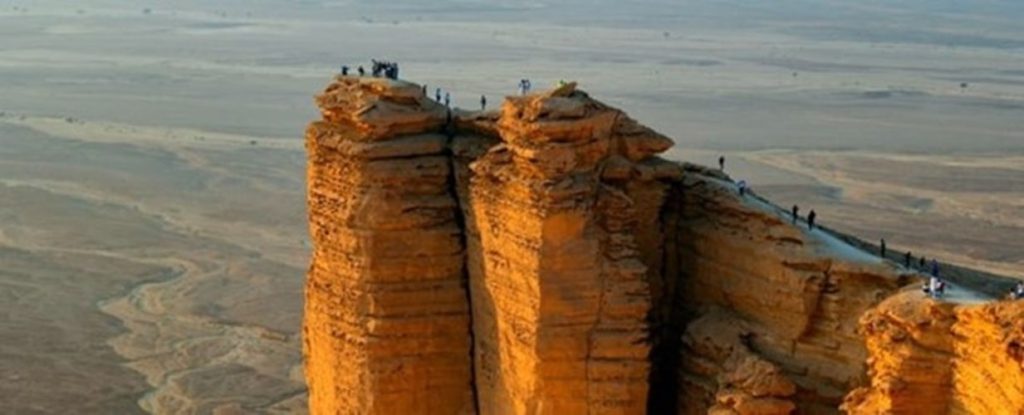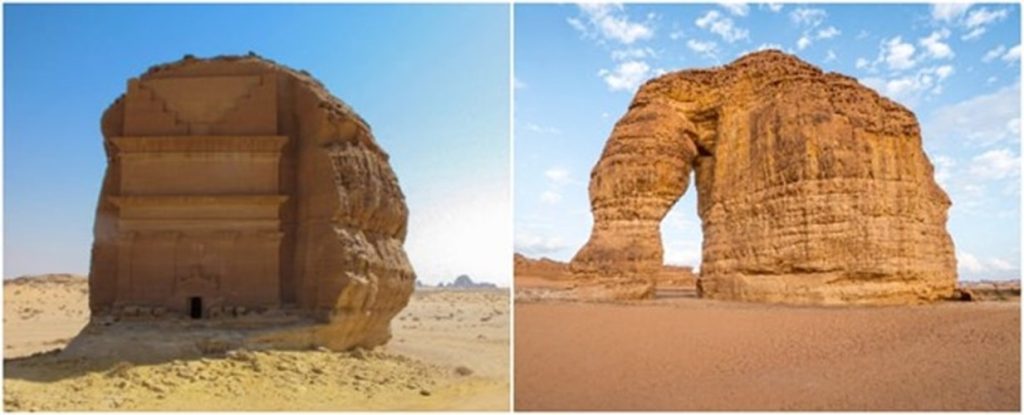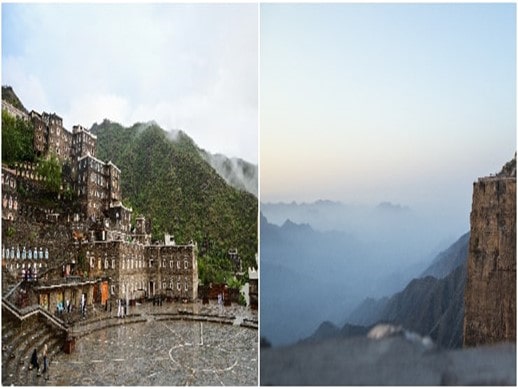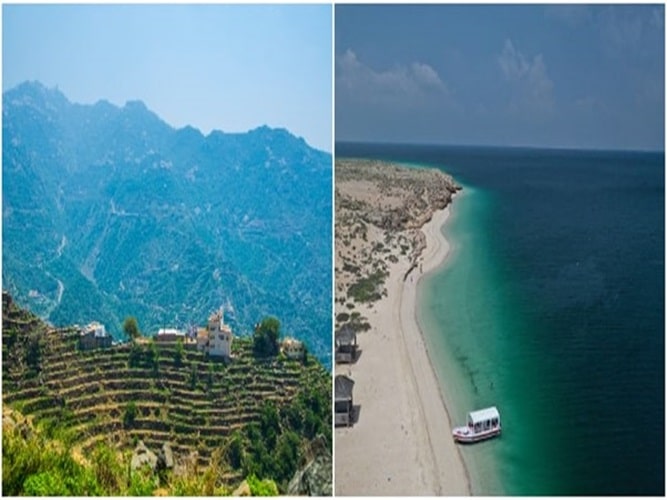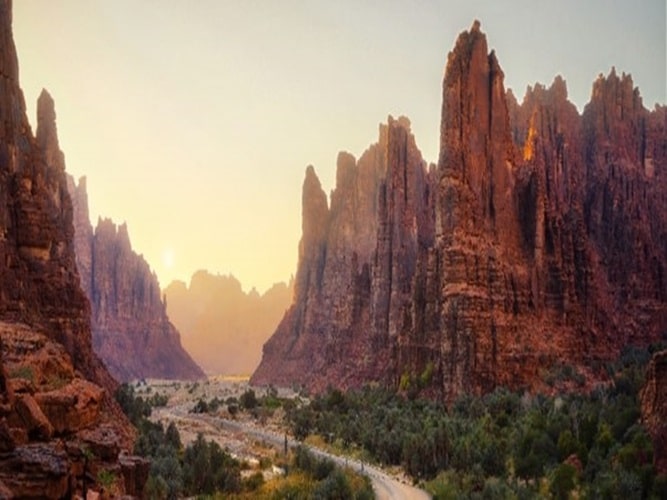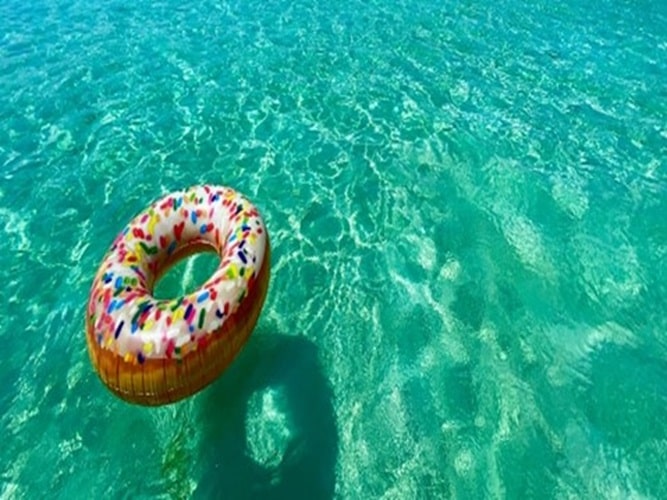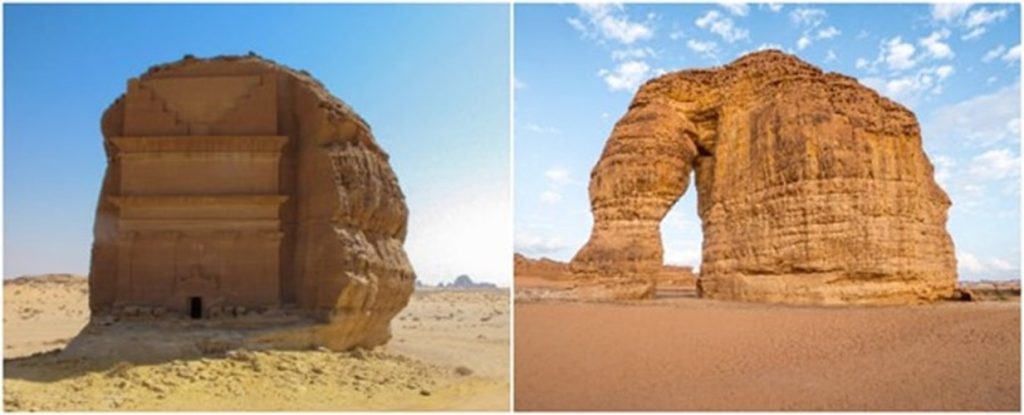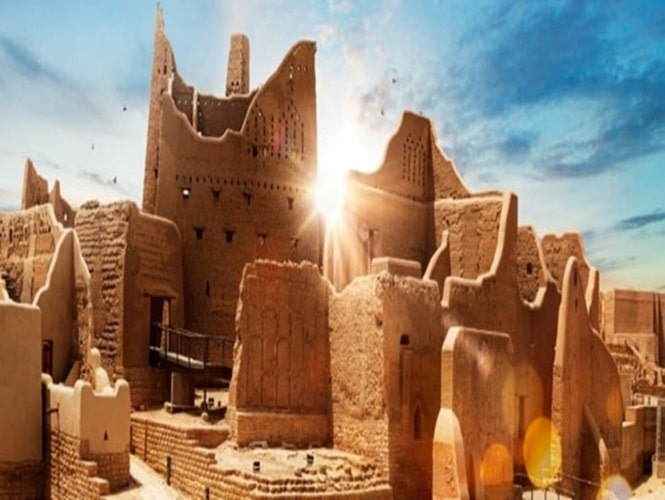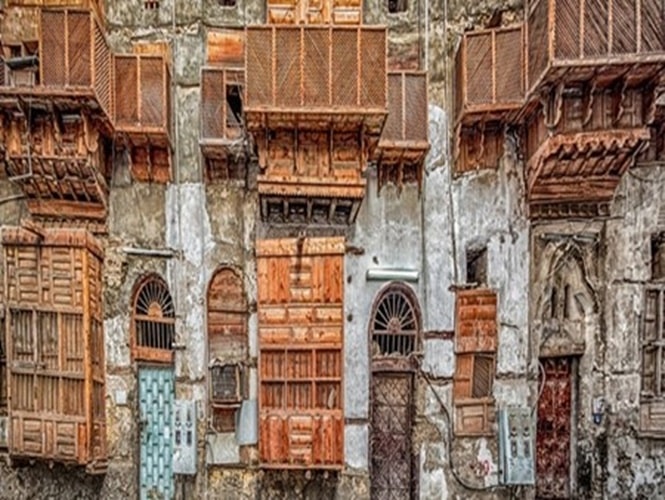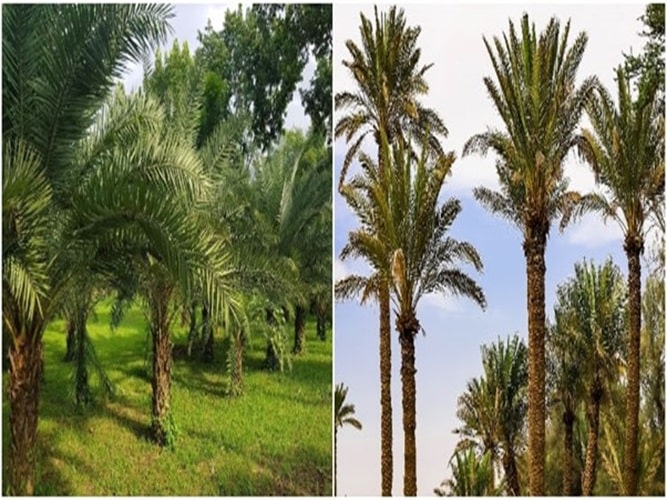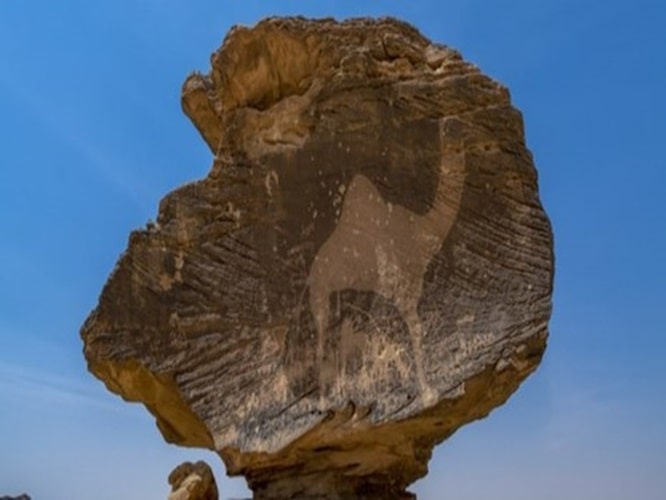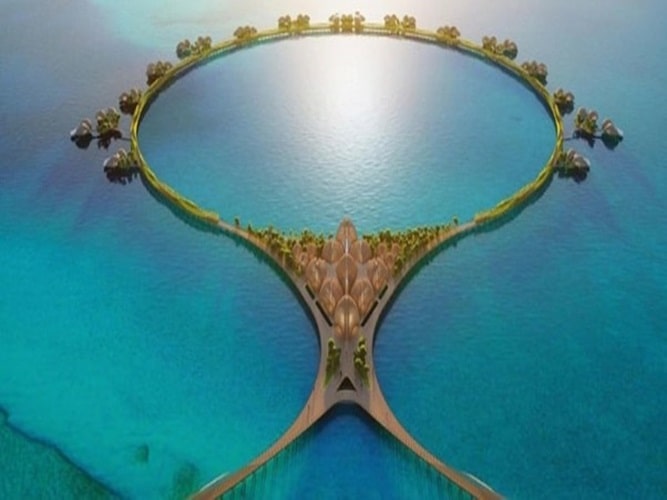By Rozina Mustafa
Behind its façade of a high-rise, industrial cosmopolitan country, Saudi Arabia hides an oasis of hidden gems with a unique blend of natural beauty, tranquillity, and an incredibly rich history. This country has shown unwavering interest in preserving every bit of the Kingdom’s cultural heritage and has six UNESCO World Heritage sites. Saudi Arabia has been spearheading innovation and has a lot to offer from its ancient heritage and unique cultural significance, breathtaking outdoor activities, and delectable gastronomy. The warm hospitality and inspiring diversity of this country are legendary. From the snowcapped mountains of Tabuk in the north to scenic mountain ranges in the Asir region, each region offers a spectacular combination of unparalleled natural landscapes and a galore of extraordinary, breathtaking experiences. Saudi Arabia has become a unique and unmissable destination, with an untouched paradise of coastline around 3400 km along the Red Sea in the west and the Arabian Gulf in the east. From all-out luxury in a palatial resort to mesmerizing adrenaline-pumping adventures in the dazzling deserts to endless pristine beaches and witnessing breathtaking sunsets over the jagged mountain peaks, there’s an endless array of activities beckoning for exploration.
READY, SET, EXPLORE
Here are some must visit places to explore in Saudi Arabia
Jeddah-Feel the calmness and peacefulness
Nicknamed ‘The Bride of the Red Sea’, this coastal city has a lot to offer, from its beaches to UNESCO heritage sites and archaeological landmarks. The city that never rests won’t allow you to slumber from all the options it has Home to the Saudi Arabia Grand Prix, this vibrant city is well known for its diverse cultures, breathtaking serene beaches, traditional souks reflecting the local customs, attractive folklore, and culinary excellence. From traditional Arabic dishes to contemporary multinational dishes, Jeddah is curated for foodies. Sitting at the crossroads of historic trading routes, the UNESCO heritage site of historical Jeddah comprises a plethora of historical stories. The Tayebat Museum offers a living history lesson on the foundation of Jeddah. Marvel at the world’s tallest King Fahd Fountain, a mesmerizing display of water and light, and don’t miss the chance to admire the world’s largest Guinness record flagpole. Jeddah is a haven for shopping enthusiasts indulging in retail therapies from high-end luxury stores to traditional souks. Immerse yourself in the splendor of Jeddah’s 30-kilometer coastal sanctuary, where the sea meets the city. Jeddah Promenade is a must-visit, located on the fringes of the Red Sea. Jeddah also acts as a gateway and entry point for pilgrims embarking on their journeys to Makkah and Madinah.
Within Striking distance: King Abdullah Economic City
Located on the coast 120 kilometers north of Jeddah, is an urban oasis with big ideas and a bustling hub for business and leisure alike. Dotted with recreational facilities and leisure destinations indoors and outdoors, it is the perfect sanctuary for a weekend trip. Embraced by the Red Sea coast on the west and the city’s natural lagoon and mangroves on the east, KAEC has a lot to offer, from a wide range of water sports such as boating, snorkeling, and diving to biking to indoor and outdoor activities such as Juman Karting, a mini golf course, tennis and volleyball courts, children’s playgrounds, a swimming pool, exercise, and bicycle stations.
Moon Valley: Moon Valley is Jeddah’s hidden gem for camping or stargazing trips. Around 70 kilometers from Jeddah, Moon Valley is located near the Usfan neighborhood. This desert landscape offers calmness and serenity from the hustle and bustle of city life. The feeling of being enveloped in complete silence was just remarkable. The enchanting view of the night sky is a breath-taking experience as you lay down and unwind for hours.
Taif -The summer Capital
A trip to the mountain city of Taif, situated 1800 meters above sea level, is an enticing experience. Taif’s cooler climate makes it a popular year-round staycation destination. Situated among the bronze peaks and verdant valleys of the Hijaz Mountains, one can witness a picturesque serpentine road through the Alhada Mountains. With its mountainous setting, Taif has a lot of outdoor activities, from energizing hikes to stargazing. a magnet for outdoor lovers with its lush emerald green valleys and dramatic panoramic lookouts. It is nicknamed the city of roses due to the famous aromatic rose flowers that flourish in the valleys and mountains. From its fragrant rose farms to the remarkable exhibits at the Sharif Museum, Taif has something to captivate every visitor.
Peep Out at the Neighbourhood
The largest and deepest volcanic crater in the kingdom is 250 kilometers away from Taif. This magnificent crater is not just a visual marvel but also an excellent hiking destination.
Riyadh-The City without Limits
A scintillating mix of metropolitan vibes in the capital city embraces a unique charm of history and business intertwined. Being the largest city in the kingdom, this enchanted city is an exceptional world-class city that embodies a unique urban identity with its glistening skyscrapers alongside the age-old landmarks that stand testament to its birth. from resplendent designers’ brand stores and from an array of top-notch, well-known restaurants that offer lavish levels of comfort and make it rich pickings for the people. From the historic sites such as Al Bujairi Heritage Park, Masmak Fortress, King Abdulaziz Historical Center, Al Murabba Palace, and Riyadh National Museum to the modern marvels such as Kingdom Tower, Via Riyadh, U Walk, and Boulevard Riyadh, Riyadh offers an array of attractions. The awe-inspiring beauty and breathtaking scale of the KAFD (King Abdulla Financial District) Riyadh is a sight to behold. A stroll through the boulevard is fully loaded with entertainment areas such as theatres and restaurants, sports, and games, providing unmatched pleasant experiences for its visitors. The iconic Kingdom Tower is the fifth-tallest skyscraper and provides a bird’s-eye view of Riyadh city at the sky bridge, soaring at 99 floors and a height of 300 meters. Al Masmak Fortress, converted into a museum, is in the heart of Riyadh and is a historical symbol of unification in Saudi Arabia.
Within Striking distance: The Edge of the World
The Edge of the World: Jebel Fihrayn, known as The Edge of the World, is a breathtaking natural wonder situated just 90 km from Riyadh city. Travelers from across the globe flock to witness its mesmerizing vistas and stunning landscapes, as it’s one of the most dramatic views in the country. The Edge of the World got its name from the uninterrupted view of the horizon from atop its 300-meter-high cliffs. From this vantage point, visitors can look out over the surrounding plain for miles and miles, taking in the rugged landscape of rock layers, deep valleys, and rocky outcroppings stretching before them.
AlUla- History Comes Alive
Widely known as the Petra of Saudi Arabia, AlUla, a land full of mystery, is distinguished by mammoths of rock formations, captivating sand dunes, and archaeological ruins that spread throughout the landscape to reflect its past to the perfect. This remarkable region once thrived as a bustling civilization dating back to the 1st century BC, serving as a vital hub for trade and commerce. Among the myriad relics that adorn AlUla, the most renowned is Madian Saleh, a UNESCO World Heritage site and the second-largest historical Nabatean capital after Petra. The city’s most iconic landmark-Elephant Rock, commonly known as Jabal Al Feel is a natural wonder resembling an elephant with an elongated trunk. Standing at an impressive height of 52 meters, it is surrounded by a majestic landscape of awe-inspiring rock monoliths. The Old Town is an archaeological site that contains the remnants of old houses, ancient heritage buildings, mosques, and markets that date back approximately seven centuries. Maraya is the Guinness World Record holder for the world’s largest mirrored building, reflecting the sun out to the sky and shining brightly like a diamond in the desert. Alula thrills with plenty of outdoor activities for adrenaline junkies, such as ziplining, hiking, stargazing, cycling trails, camping outdoors, hot air balloon rides, and helicopter rides. Discovering the ancient volcanoes, hidden canyons, undiscovered marvels, and desert valleys through a helicopter ride is undoubtedly one of the most exhilarating ways to uncover the breathtaking view and be mesmerized by the beauty of the skies.
Abha-The Capital of Clouds
Perched at a lofty altitude of 2,270 meters above sea level on the mountains of Sarawat, Abha is the vibrant capital of the Asir region—a splendid gateway to explore the mountainous wonders of the kingdom and enjoy the vivid beauty of nature. Abha is a natural wonder, graced with mesmerizing mountain forests and majestic peaks, and enjoys a consistently cool climate throughout the year. This highland paradise offers a plethora of captivating attractions, from towering mountains that seem to touch the sky to the historic mud-walled Shada Palace (now a museum) to the serene lake and amusement park. Whether you’re wandering through the Al Muftaha art village or delving into the customs of tribes in the nearby picturesque villages of Al Habala and Rijal Almaa, there’s an immersion in heritage and tradition. Abha is home to Jabal Saudah, which is the highest peak in Saudi Arabia with an elevation of 3,000 meters above sea level. For an enchanting experience, hop on the cable car in Al-Saudah and behold mesmerizing bird’s-eye views of misty mountaintops and the exquisite beauty of its valleys.
Recently, a master plan has been announced to develop Al-Soudah and parts of Rijal Almaa into Soudah Peaks, a luxury mountain tourism destination set 3,015 meters above sea level on Saudi Arabia’s highest peak.
Jizan -The Jewel of Red Sea
Jizan is known as the “Southern Pearl of Saudi Arabia,” which stretches majestically for 200 kilometers along the Red Sea coast in the southern region of Saudi Arabia. This coastal gem is known for its exceptionally crystal-blue waters, captivating coral reefs, and endemic bird species. Situated approximately 50 km off the coast of Jizan in the Red Sea, the Farasan Islands archipelago consists of a total of 84 islands, with only three of them being permanently inhabited. These islands are well known for their pristine beaches, crystalline waters, vibrant coral reefs, diverse wildlife both on land and in the sea, and the presence of rare and unique living creatures. The islands are accessible via a convenient free ferry service departing twice daily from the port of Jizan. A visit to the Wadi Lajab Valley is an enchanting experience. This valley is distinguished by its lush greenery, transforming the mountainsides into a picturesque garden oasis. Fayfa mountain hanging village ascends to heights exceeding 2,000 meters above sea level and is referred to as “The Neighbours of the Moon.” The roads leading to these majestic peaks often breathtakingly rise above the clouds, and the steep slopes make it an ideal area for hiking.
Tabuk-Pooled with Nature
Situated in the northwestern region of Saudi Arabia, the Tabuk region is known for its scenic valleys and towering mountains, which are blanketed with snow every winter. This region boasts over 15 notable mountains, among which Jebal Al-Lawz is the tallest peak. Popularly called ‘the Mountain of Almonds’, this mountain is situated closer to the Jordanian border and rises 2,549 m above sea level. The Tabuk region provides abundant opportunities for hiking, camping, and skiing. One of the famous valleys, Wadi Disah, is a breathtaking valley full of amazing, sculpted sandstone cliffs and pillars and beautiful, lush palm trees. From historical antiquities and archaeological sites to desert camping and pristine beaches, it’s a two-in-one spot for historic buffs and nature lovers. The Saudi government, under Vision 2030, has planned several different projects, like the Red Sea Project, the ultra-luxury destination AMAALA, and the city of the future, NEOM.
Within Striking Distance: Umluj
Umluj is a city in Tabuk Province, which is in the northwest of Saudi Arabia and comprises 104 islands in the Red Sea. This charming coastal town is a place of celestial, whimsical, and enchanting beauty and is endearingly called the “Maldives of Saudi Arabia” for its unparalleled allure. The turquoise ocean beckons with its unspoiled, pristine white sandy beaches, crystal-clear turquoise waters, abundant coral reefs, serene sunsets, and untouched shorelines. Umluj boasts a natural splendor and is a haven for snorkeling and diving enthusiasts. Embark on a boat tour to witness the breathtaking marine life, or simply unwind on the sandy shores and soak up the serenity of this picturesque destination. This corner of the Red Sea is a treasure trove for nature enthusiasts. It’s the perfect seaside escape for those who cherish the sea.
Six UNESCO Sites in Saudi Arabia
Saudi Arabia has 6 UNESCO heritage sites. Exploring Saudi Arabia’s UNESCO sites is a journey through time. These sites provide a unique glimpse into ancient human civilizations and the evolution of life in the Middle East region.
1.Madain Saleh – Al Ula
Saudi Arabia’s first-ever UNESCO world heritage site, Mada’in Saleh, is a testament to its historical and cultural significance and the largest archaeological site of the Nabataean civilization. It contains more than 50 inscriptions from the pre-Nabataean civilization and 111 well-preserved tombs, 94 of which are decorated with inscriptions and ornaments. The iconic tomb of Qasr Al Farid stands as the largest among them, soaring to a height of 72 feet, which is the tomb of Lihyan, the son of Kuza.
2. At-Turaif District-Ad Diriyah
On the outskirts of Riyadh, UNESCO-listed Diriyah is an archaeological jewel dating back to the 15th century. The mudbrick houses, palaces, and mighty citadel at At-Turaif are the ancestral home of the Al Saud royal family, were built in the Najdi architectural style, and were the birthplace of the first Saudi state. Every corner of the district provides a glimpse into the nation’s significant history. Today, Ad Diriyah forms the heart of one of the most ambitious tourism development projects in the world: Diriyah Gate.
3.Historic Jeddah- Jeddah
The rock art documents a civilization that lived in Hail, which is located between two great mountains: Umm-Sinman Mountain in the city of Jubbah, and Al-Manjoor and Raat at Shuwaymis. This area was once home to a large lake. Its legacy is a mass of petroglyphs detailing life here as far back as 10,000 years ago. Scattered across its landscapes, you can see the rock art portraying humans and a variety of animals, including camels, horses, goats, deer, gazelles, lions, and ostriches, in various sizes and forms.
- Al-Ahsa Oasis- Al Ahsa
Founded in the early of 7th Century, the city’s old town, known as Al-Balad, served as Jeddah’s commercial centre, featuring cobbled streets, narrow alleys traditional houses, and bustling markets. Al Balad beautifully captures the evolution of the city through the centuries The gateway Baab Makkah is here in the historic Jeddah which once connected as a gateway to the spiritual journey towards Makkah and Madina. Visitors can wander through lively markets, indulge in local cuisine and fully immerse themselves in the vibrant local culture.
6.Hima Cultural Area, Najran
The Hima Cultural Area is in the mountainous area of southwestern Saudi Arabia and is home to one of the largest rock art complexes in the world. The city is dotted with one of the region’s ancient caravan routes, featuring a substantial collection of rock art images depicting hunting, fauna, flora, and lifestyles in a cultural continuity of 7,000 years. It is one of the largest open museums for archaeological rock inscriptions. It is also known for its beautiful traditional architecture and heritage villages.
Going Ahead -The land of Future
Undoubtedly, Saudi Arabia is going to be the new frontier of tourism. Saudi Arabia’s Vision 2030 plan places a strong emphasis on developing the tourism sector to diversify the economy. Saudi Arabia’s tourism industry has been able to highlight its strengths by launching giga projects across the Kingdom. The Giga projects focus on sustainability at their core. Among the numerous tourism ‘Giga projects’ under Vision 2030 in Saudi Arabia, The Red Sea Project and Neom are perhaps the most ambitious ones. Nestled between the towns of Al Wajh and Umluj, spanning over 200 kilometers of the Red Sea coastline, the Red Sea project is part of the Kingdom’s plan to transform travel and hospitality, offering ultra-luxurious experiences for its visitors. Diving and snorkelling in the Red Sea are regarded as the finest in the world, as it is untouched by the world. The $500 billion city of the future, NEOM, will be a vibrant tourism hub by 2030. The World Expo 2030 as well as the 2034 football world cup will be held in Saudi Arabia and it’s a chance to see Saudi’s rich culture, sustainable megaprojects, iconic heritage sites, and sports events.
- Sindalah-A luxury island destination in the Red Sea.
- THE LINE: New wonders for the world.
- Trojena-Home to the Gulf’s first outdoor ski resort and host to the Asian Winter Games 2029.
- Oxagon: The largest floating industrial complex in the world.
The next time you slake your thirst for adventure and adrenaline, skip the regular, conventional countries and consider heading to unexplored places scattered across Saudi Arabia, which offer a perfect combination of unparalleled natural beauty, dramatic landscapes, burring cultures, and most importantly, a dash of uniqueness, which will make your trip an unforgettable experience.





